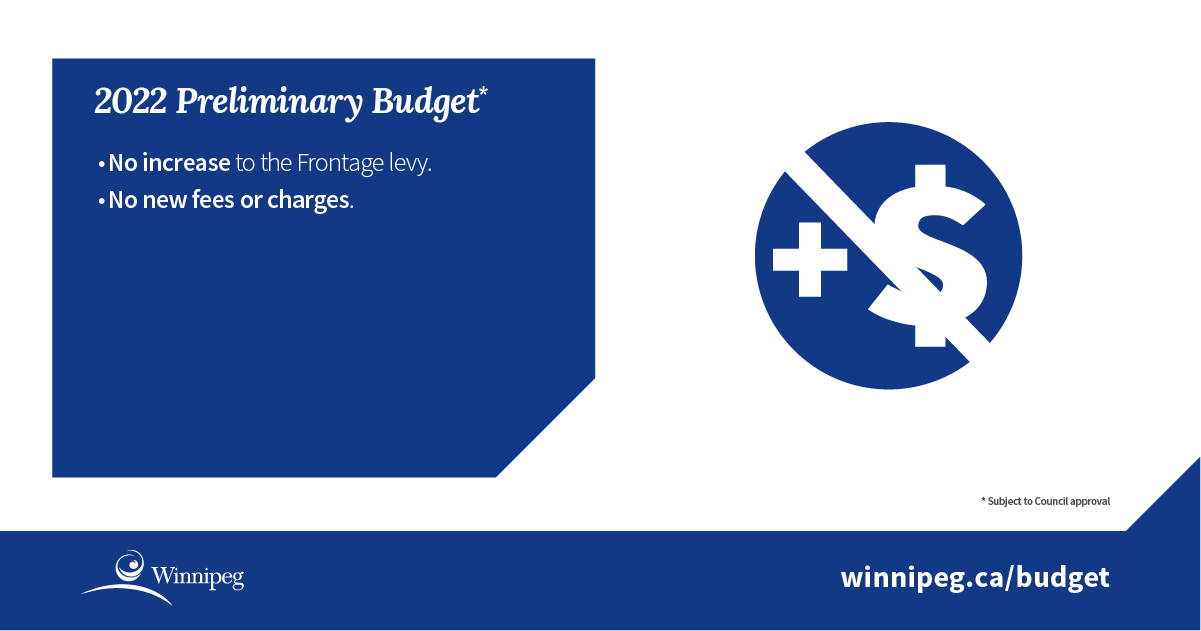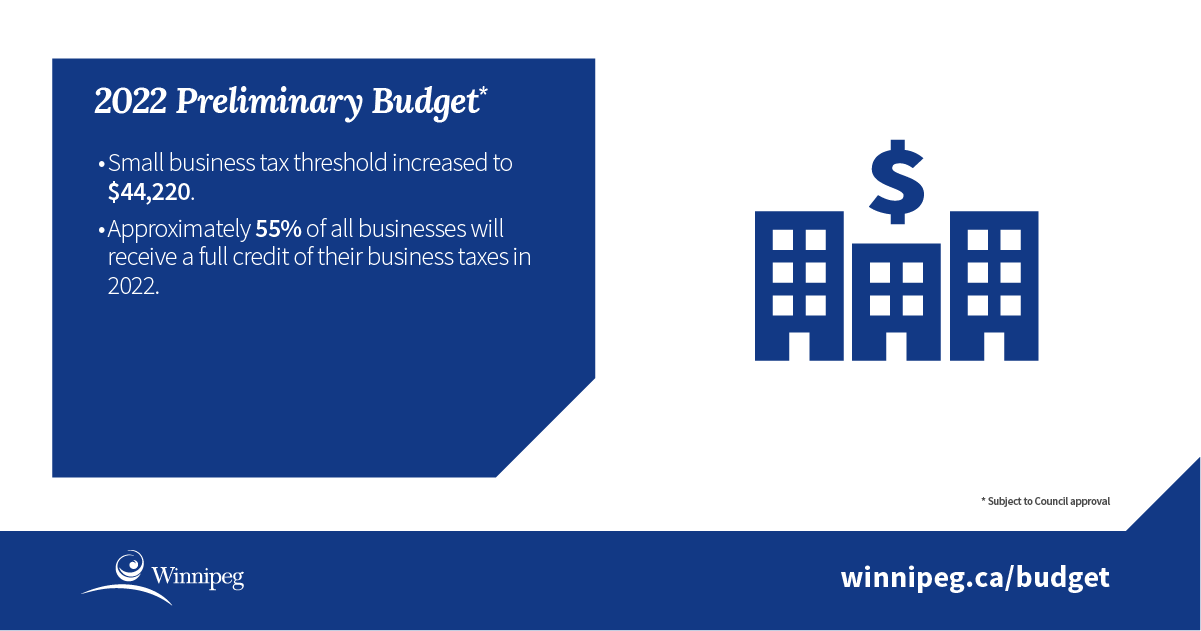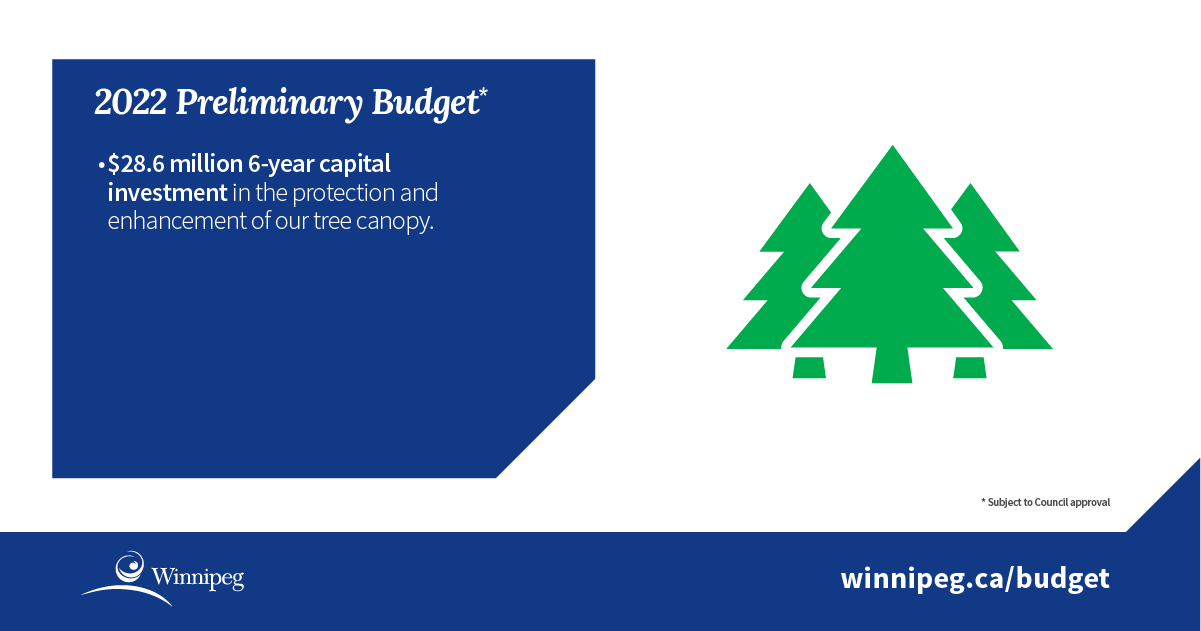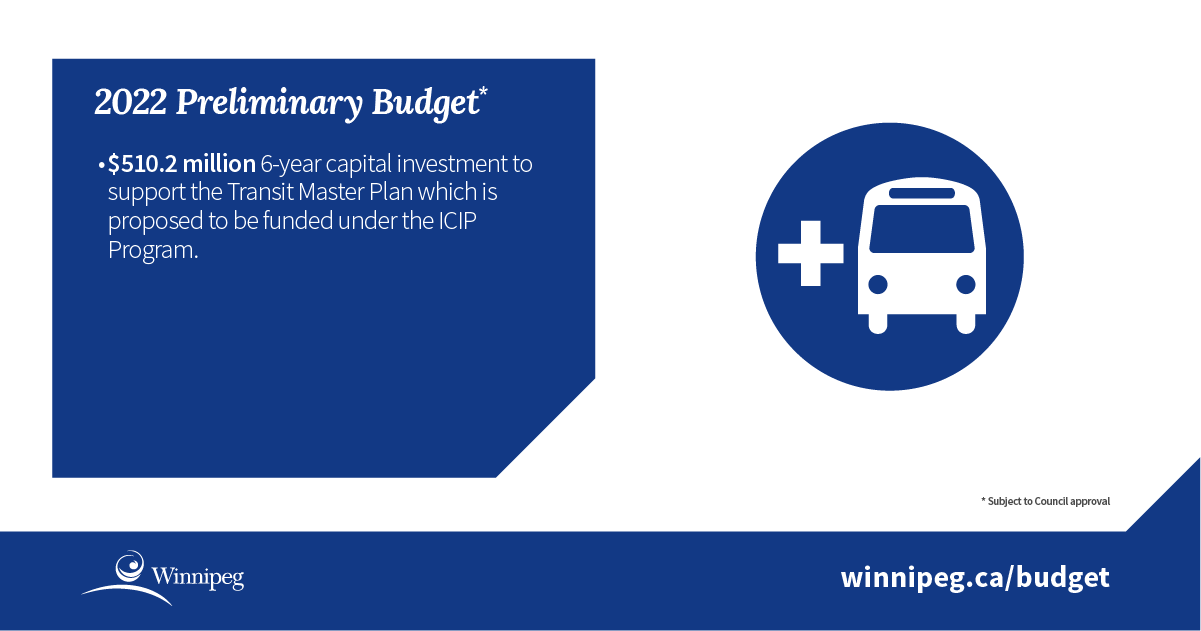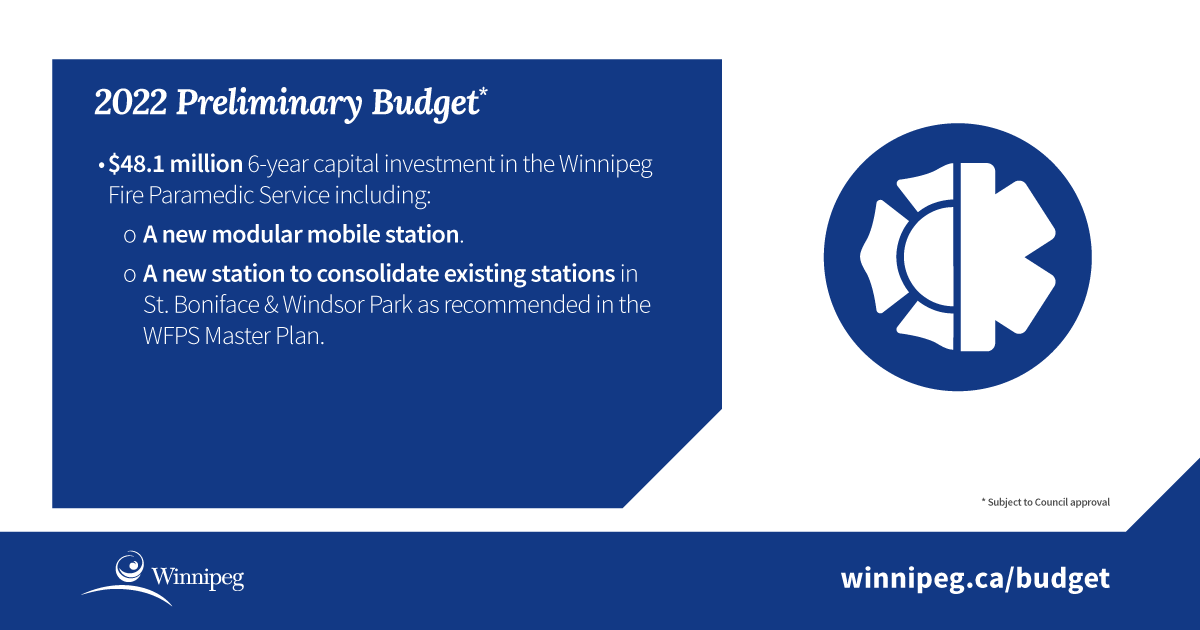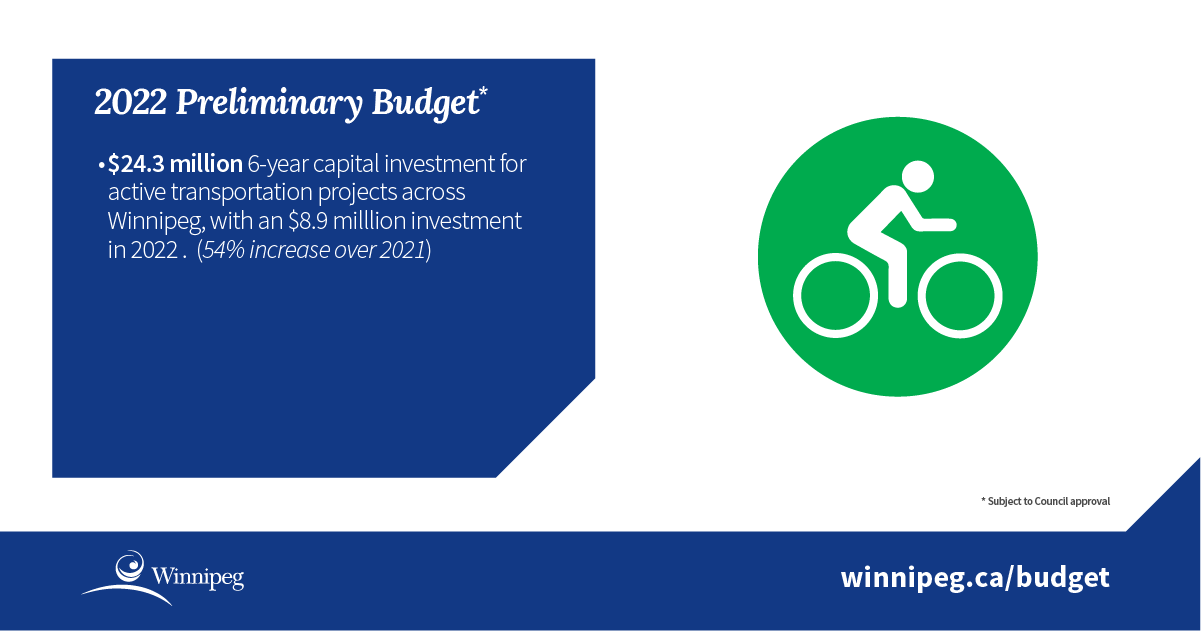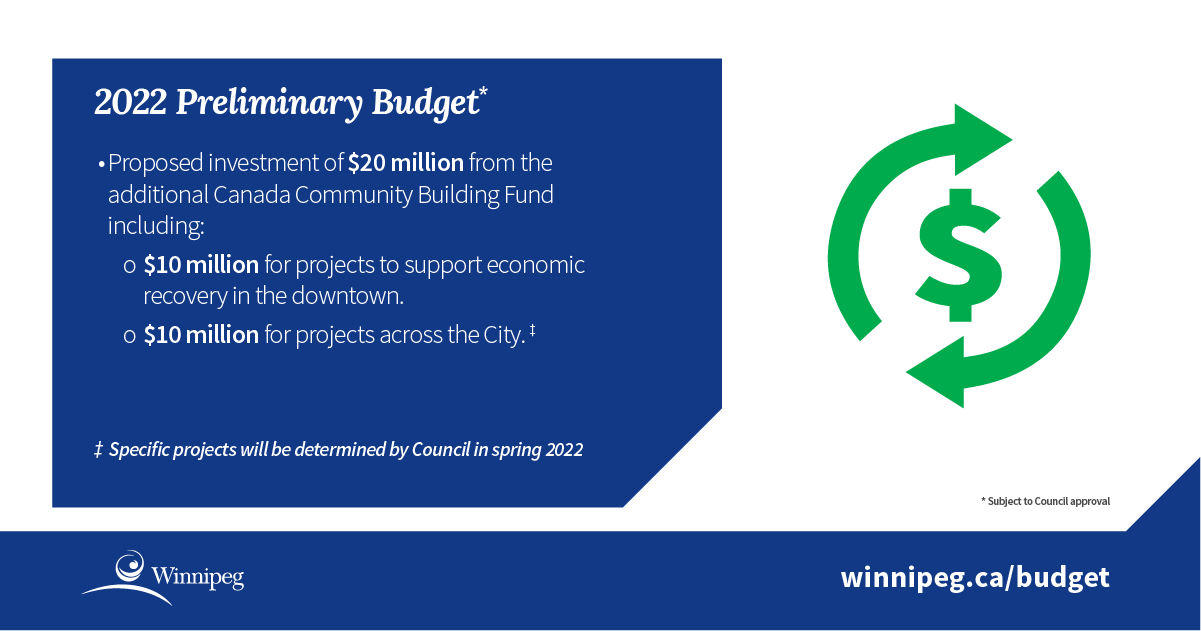Holiday season – View holiday hours for City of Winnipeg facilities and services from December 24 to January 1.
Multi-year budget: 2022 update
Letter from the Mayor and Chairperson of the Standing Policy Committee on Finance
Introduction
We are pleased to table the Preliminary 2022 Balanced Budget Update to the 2020-2023 multi-year balanced budget.
In March 2020, Council adopted a historic four-year balanced budget for 2020-2023. Immediately afterwards, we were faced with the onset of the COVID-19 global pandemic.
In response to the pandemic, Council promptly adopted a COVID-19 Crisis Cash Flow Management Plan with the multi-year balanced budget as its foundation. We continue to rely on the strength of this plan as we address the ongoing financial consequences of the pandemic.
Over the last two years, many of our city facilities, local businesses, and schools closed multiple times as required by Province of Manitoba’s public health orders. The social, economic, and financial impact of these closures have been, and continue to be, significant. However, with the overwhelming majority of eligible Winnipeg residents now fully vaccinated, we are optimistic that we will better weather the storm of the pandemic going forward and begin to slowly and cautiously embark on a multi-year recovery.
Building on the unprecedented level of public engagement from the balanced budget process over the last two years, the Preliminary 2022 Balanced Budget Update reflects ongoing feedback we heard throughout this past year and through the annual citizen satisfaction survey. Most recently, telephone and online surveys were completed to obtain feedback from our residents on their balanced budget priorities.
As well, the Preliminary 2022 Balanced Budget Update reflects feedback received by the Chair of Finance from every member of Council. Today’s tabling of the Preliminary 2022 Balanced Budget Update continues the open and transparent balanced budget review process.
The Preliminary 2022 Balanced Budget Update presents a balanced operating budget for 2022. It also forecasts a
balanced operating budget for 2023. It achieves balance over two years while staying true to Council’s
multi-year balanced budget, with frozen 2016 operating grant funding from the Province of Manitoba, and capping
property tax increases at 2.33 percent.
Overall, we believe the Preliminary 2022 Balanced Budget Update represents a prudent and disciplined financial
blueprint that protects vital City services, invests in key infrastructure priorities, and supports the City’s
COVID-19 Economic Response and Recovery Plan.
Tax Supported Operating Budget and the Financial Stabilization Reserve
Prior to addressing any additional costs related to the COVID-19 global pandemic, we were facing a shortfall of $13.3 million in the tax supported budgets for 2022 and 2023. This non-COVID-19 shortfall was due to the most recent Police Pension Plan valuation, which required additional employer contributions of $12.5 million over the next two years (which are unrelated to a previous arbitrators’ decision on police pension plan reform), as well as $3.4 million related to the new federal holiday, National Day for Truth and Reconciliation. These costs are partially offset by projected savings in other areas of the operating budget.
To put the non-COVID-19 shortfall of $13.3 million into perspective, had the pandemic not occurred, the shortfall of $13.3 million that would need to be addressed in this year’s Balanced Budget Update would have been less than one percent of the total tax supported operating budgets for the next two years. This reflects the strength and resiliency of the multi-year balanced budget.
In 2022, the City will continue to face a COVID-19 related budget shortfall of approximately $36.1 million which includes:
- $26.4 million within Winnipeg Transit which is primarily due to projected ridership in 2022 being 60-75 percent of 2019 pre-pandemic levels;
- $5.4 million less parking revenue in 2022;
- $2.7 million due to lower anticipated fee revenues at pools and recreation centres, together with additional costs for cleaning these facilities;
- $1.6 million related to reduced entertainment tax revenue; and
- other COVID-19 related costs.
The projected COVID-19 related shortfall assumes no further pandemic related lockdowns in 2022 and a gradual reduction of the current Provincial public health orders over the course of 2022. It also assumes no COVID-19 related costs beyond 2022.
To help offset the shortfall of $26.4 million within Winnipeg Transit, we will maintain the same six percent reduction in transit service in 2022 that was adopted by Council in 2021. We are also proposing a one-time drawdown on Winnipeg Transit’s retained earnings. These two measures will reduce the shortfall within Winnipeg Transit by approximately $5.9 million, resulting in a net shortfall of $20.5 million in 2022. This shortfall will need to be covered by Winnipeg taxpayers, barring a decision by the provincial government to reinstate the 50/50 transit operating agreement and/or receiving additional transit operating support from the federal and provincial governments.
The total 2022 and 2023 shortfall in the tax supported operating budget is $43.5 million. This includes the two-year non-COVID-19 shortfall of $13.3 million and a COVID-19 related shortfall (net of savings within Winnipeg Transit) of $30.2 million.
Addressing the balanced budget shortfall in the context of the pandemic requires discipline and innovation to limit expenditures and manage revenues.
In 2022, we are proposing to invest a record $164.7 million into local and regional road renewal, which includes an additional $2.2 million contribution over the forecasted plan for our regional roads program dedicated entirely to Active Transportation projects that are funded from existing service sharing agreements with neighbouring municipalities. How we finance this investment will temporarily change however from previous years. In 2022, $12.6 million from the proposed two percent increase in property tax will be used to protect front line services rather than financing regional and local road renewals. The $12.6 million for regional and local road renewals will instead be funded by Winnipeg’s share of the additional Canada Community-Building Fund (formerly called the Federal Gas Tax fund) which can only be used for capital investments. This will allow us to maintain a record $164.7 million investment in road renewals in 2022 while also protecting vital services during the pandemic.
The remaining 0.33 percent of the 2.33 percent property tax increase proposed in 2022 will continue to be invested in the Southwest Rapid Transitway. In 2023, as the multi-year recovery from the pandemic continues, the 2.33 percent property tax increase would once again be invested in its entirety into road renewal and the Southwest Rapid Transitway, if adopted by Council.
The Preliminary 2022 Balanced Budget Update contains several measures to eliminate the operating balanced budget shortfall and bring the tax supported operating budget into balance over the next two years. A detailed accounting of all the measures proposed to balance the operating budget can be found in Volume 2 of The Preliminary 2022 Balanced Budget Update. Some of the most significant measures proposed to balance include:
- $12.6 million from allocating the two percent property tax increase to the operating budget in 2022;
- $10 million from a one-time draw from the Financial Stabilization Reserve in 2022;
- $6.1 million in additional expenditure management savings within the Winnipeg Police Service operating budget over the next two years (equal to approximately 50 percent of the cost of the additional police pension expenditure); and
- $5.4 million of savings to be achieved by replacing cash to capital with internal debt financing.
The Preliminary 2022 Balanced Budget Update also contains important new temporary investments to support our most vulnerable residents during the multi-year recovery phase of the pandemic. These include:
- $1.1 million to support mobile outreach services and address homeless encampments;
- $580,000 to support the operation of public washrooms in the downtown area; and
- $500,000 for staffing support to deliver the Rapid Housing Initiative funds that the City has received from the federal government.
The Preliminary 2022 Balanced Budget Update also includes an additional investment of $4 million for the maintenance and preservation of our tree canopy, bringing the total investment within the operating budget to $31 million over the next two years.
There are no new fees or charges contained in the Preliminary 2022 Balanced Budget Update.
Overall, the tax supported operating budget will continue to increase annually by an average of 1.3 percent from 2020 to 2023 which is in line with the multi-year balanced budget. This increase is among the lowest annual increases in tax-supported expenditures in the last decade.
The Financial Stabilization Reserve (FSR) will continue to provide stability while the City faces financial uncertainty associated with the COVID-19 global pandemic. The proposed draw of $10 million from the FSR will allow the City to continue to protect vital city services in 2022 while leaving a projected balance of approximately $83.8 million in this reserve at the end of 2022. This amount is the Council mandated level of six percent of tax-supported operating expenses.
Six-year Capital Investment Plan
Investments in capital infrastructure are critical to support a modern, growing city. They are also one of the most important tools available to governments to support businesses and jobs for local residents in times of economic uncertainty, and are foundational to the City’s COVID-19 Economic Response and Recovery plan.
This is why the Preliminary 2022 Balanced Budget Update proposes a six-year capital investment plan of approximately $2.9 billion to renew existing city assets and build new assets that will be required as our city grows toward one million people. The current six-year capital investment plan this year is approximately $627 million higher than the last year’s six-year plan. This is primarily due to including the Council approved application for new investments in Winnipeg Transit under the Investing in Canada Infrastructure plan (ICIP) in this year’s six-year capital investment plan.
We estimate that the proposed six-year $2.9 billion capital investment plan will boost GDP by over $1.3 billion in Manitoba and $375 million across Canada, create over 10,800-person years of employment in Manitoba and generate incremental tax revenue to the provincial government of $147.5 million and $194.2 million to the federal government.
A significant part of the six-year capital plan is investing in road renewal. In 2022, we will invest $164.7 million in regional and local road renewals, another record annual level of investment. Over the next six years the projected level of investment in roads is $872.9 million, which surpasses last year’s six-year total of $864 million. This investment will allow for approximately 1,035 lane kms of roads to be reconstructed or renewed which is a little more than the distance from Winnipeg to Churchill.
Other significant investments in the six-year capital investment plan include:
- $510.2 million of tri-level government investments that support the Winnipeg Transit Master Plan, which is proposed to be funded under the ICIP program;
- $240 million to accelerate the City’s investment in the Combined Sewer Overflow mitigation program, a $60 million increase from the six-year forecast last year;
- $95.4 million for the Southwest sewer interceptor, an increase of $35.4 million from the six-year forecast last year;
- $27.3 million investments in fire stations in St. Boniface and Windsor Park, Waverley West, Silver Heights and a modular mobile station;
- $28.6 million investment in the protection and enhancement of our tree canopy; and
- $24.3 million for active transportation projects across Winnipeg.
The capital investment plan includes a specific focus in 2022 on outdoor recreation and open spaces with $23.8 million of investments including:
- $8.9 million (a 54% increase over 2021) for active transportation;
- $11.8 million for parks and open spaces; and
- $3.1 million for spray pad amenities.
The six-year capital investment program will be primarily financed through federal grants of $569.9 million including the additional top-up of the Canada Community-Building Fund $43.9 million, provincial capital grants of $251.6 million, cash to capital of $86.5 million, revenue from frontage levies of $60 million, and external debt of approximately $291.4 million. The external debt of approximately $291.4 million for the new capital investment over the next six years is an increase of $74.2 million from the six-year forecast last year of $217.2 million last year, but still within the City’s self-imposed debt limits.
Multi-year Economic Response and Recovery from the COVID-19 Pandemic
The Preliminary 2022 Balanced Budget Update contains significant investments to support the City’s COVID-19 Economic Response and Recovery Plan.
One of the primary ways the City can support economic recovery from the global pandemic is to provide certainty to residents and businesses on property and business tax levels. The Preliminary 2022 Balanced Budget update does this by capping property tax increases at 2.33 percent for each of the next two years which will help to ensure that Winnipeg will continue to have among the lowest property taxes in Canada.
The Preliminary 2022 Balanced Budget Update also addresses a key recommendation in the COVID-19 Economic Response and Recovery Plan by continuing to increase the Small Business Tax Threshold, increasing it to $44,220 in 2022. This will ensure approximately 55 percent of all Winnipeg businesses will continue to be exempt from paying the Business Tax.
Unlike 2021, when an increase to the Small Business Tax threshold was possible while keeping revenue from this tax constant, increasing the threshold as proposed in 2022 will result in reduced revenue to the City of $1.8 million over the next two years, which will be fully offset with savings in other areas of the balanced operating budget.
The Preliminary 2022 Balanced Budget Update also proposes significant enhancements to the permitting system which will help to support new development and drive economic growth. In 2022, we will convert 16 temporary full-time equivalent staff to 16 permanent full-time equivalent staff in the City’s Permits Division. This will allow us to provide staffing continuity and proactively address ongoing backlogs in permit processing and inspections, ensuring effective consistent treatment of permit applications.
The Preliminary 2022 Balanced Budget Update includes a full one-third cost share of approximately $20 million towards the estimated total cost of approximately $60 million, net of land purchase, to provide water and sewer services for Phase 1 A of the Airport Area West Lands located within CentrePort. The City’s funding support for this initiative will be conditional on securing matching financial support from both the Federal and Provincial governments for this project. This investment addresses key policies in Complete Communities 2.0 by bringing more serviced employment lands to the market. It also addresses a key recommendation of the COVID-19 Economic Response and Recovery Plan.
The Preliminary 2022 Balanced Budget Update includes a proposed investment of $20 million from the additional Canada Community-Building Funding which includes $10 million for projects that will support the economic recovery of the downtown as well as $10 million for projects in other areas of the City. Specific projects that will be funded from these amounts will be determined by Council in the spring of 2022.
Finally, the Preliminary 2022 Balanced Budget Update proposes an investment of $3 million in the water and sewer utility to begin the investigation of existing underground water and sewer capacity starting with the most critical areas of the city. This will be the first step toward preparing a comprehensive strategic infrastructure plan for the City as a whole, to guide development and drive economic growth into the future.
Conclusion
Over the next 15 years, Winnipeg’s population is expected to grow at a strong and steady pace toward one million people. Although the pandemic continues to impact our everyday lives, it remains critical that we stay focused on the future by investing in the services and infrastructure that will provide a foundation for a multi-year economic recovery and prepare us for life after the pandemic.
We believe the Preliminary 2022 Balanced Budget Update to the multi-year budget strikes the right balance to manage our way through the ongoing uncertain financial waters of the COVID-19 global pandemic while simultaneously presenting a sustainable fiscal blueprint to support our growing City.
We must remain focused on ensuring we are providing maximum value for taxpayers by continuing to scrutinize all of our expenditures. We must continue to work with our federal and provincial partners to maximize Winnipeg’s share of infrastructure funding for necessary investments. And, we must continue to work with our provincial government to ensure that the City of Winnipeg has a fair say in how provincial infrastructure grants are invested.
We now invite all residents and members of Council to continue the discussion to finalize the Preliminary 2022 Balanced Budget Update to the 2020-2023 multi-year balanced budgets.
Brian Bowman
MAYOR
Scott Gillingham
CHAIR, Standing Policy Committee on Finance
Multi-Year Budget Preliminary Budget schedule of meetings
Provide feedback on the preliminary budget
If you would like to provide feedback on the preliminary budget in-person, register to appear as a delegation at the appropriate committee.
If you would like to make a written feedback submission for the public record, please submit a copy to City Clerk’s.
Meeting dates
The preliminary 2022 Operating and Capital budgets for the City of Winnipeg will be tabled at a special meeting of Executive Policy Committee on Friday November 26, 2021 at 2 p.m.
After the EPC tables the budgets on November 26, 2021, the schedule of public meetings to hear delegations and consider the preliminary 2022 Operating and Capital budgets include:
Monday, November 29, 2021 - 5 p.m.
Standing Policy Committee on Innovation and Economic Development (Special Meeting)
- Planning, Property and Development Department - Economic Development 2022 Preliminary Operating & Capital Budget Presentation
- Innovation & Technology Department 2022 Preliminary Operating & Capital Budget Presentation
- Parking Authority Special Operating Agency 2022 Preliminary Operating & Capital Budget Presentation
- Animal Services Special Operating Agency 2022 Preliminary Operating & Capital Budget Presentation
- Golf Services Special Operating Agency 2022 Preliminary Operating & Capital Budget Presentation
- Fleet Management Special Operating Agency 2022 Preliminary Operating & Capital Budget Presentation
Tuesday, November 30, 2021 - 5 p.m.
Standing Policy Committee on Property Development Heritage Downtown Development (Special Meeting)
- Planning, Property & Development Department 2022 Preliminary Operating & Capital Budget Presentation
- Assets and Project Management Department 2022 Preliminary Operating & Capital Budget Presentation
- Assets and Project Management Department - Municipal Accommodations 2022 Preliminary Operating & Capital Budget Presentation
Friday, December 3, 2021 – 9:30 a.m.
Winnipeg Police Board (Regular Meeting)
Saturday, December 4, 2021 – 9:30 a.m.
Standing Policy Committee on Infrastructure Renewal and Public Works (Special Meeting)
- Winnipeg Transit Department 2022 Preliminary Operating & Capital Budget Presentation
- Public Works Department 2022 Preliminary Operating & Capital Budget Presentation
Monday, December 6, 2021 – 2:30 p.m.
Water and Waste, Riverbank Management and the Environment (Special Meeting)
Tuesday, December 7, 2021 - 2:30 p.m.
Protection, Community Services and Parks (Special Meeting)
- Public Works Department - Parks and Open Space Division 2022 Preliminary Operating & Capital Budget Presentation
- Community Services Department 2022 Preliminary Operating & Capital Budget Presentation
- Winnipeg Fire Paramedic Service 2022 Preliminary Operating & Capital Budget Presentation
Friday, December 10, 2021 - 9:30 a.m.
Executive Policy Committee to hear public delegations on budgets (Special Meeting)
Tuesday, December 14, 2021 - 9:30 a.m.
Executive Policy Committee to table final recommendations (Special Meeting)
Wednesday, December 15, 2021 - 9:30 a.m.
Council to consider budget (Special Meeting)
Scheduled meetings
NOTE: Residents are encouraged to check the Council and Committees Schedule of Meetings in case of changes to the scheduled meeting times.
Documents
- 2022 Adopted Operating and Capital Budget - Volume 2
- Supplement to the 2022 Adopted Budget
- 2022 Community Trends and Performance Report Volume 1
- 2021 Citizen Survey
- Quarterly Public Opinion Survey
- Citizens’ Views on Budget Priorities - September 2021 Probe Research Omnibus Survey
Infographics
2021 Preliminary Budget at a Glance
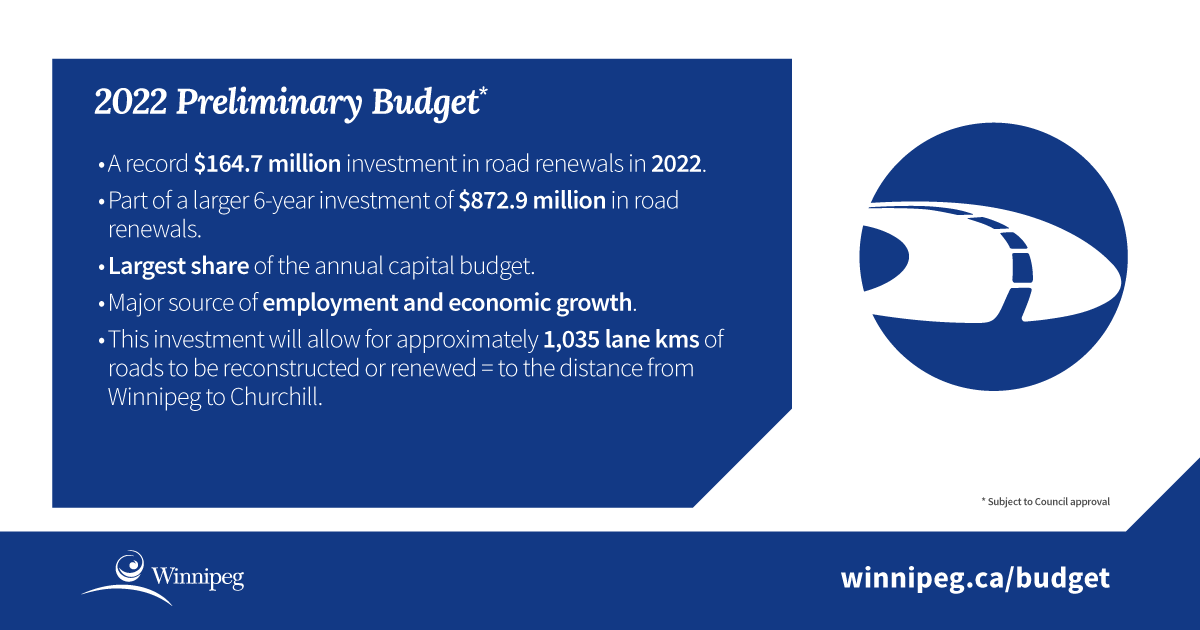
- A record $164.7 million investment in road renewals in 2022
- Part of a larger 6-year investment of $872.9 million in road renewals
- Largest share of the annual capital budget
- Major source of employment and economic growth
- This investment will allow for approximately 1,035 lane kms of roads to be reconstructed or renewed equal to the distance from Winnipeg to Churchill
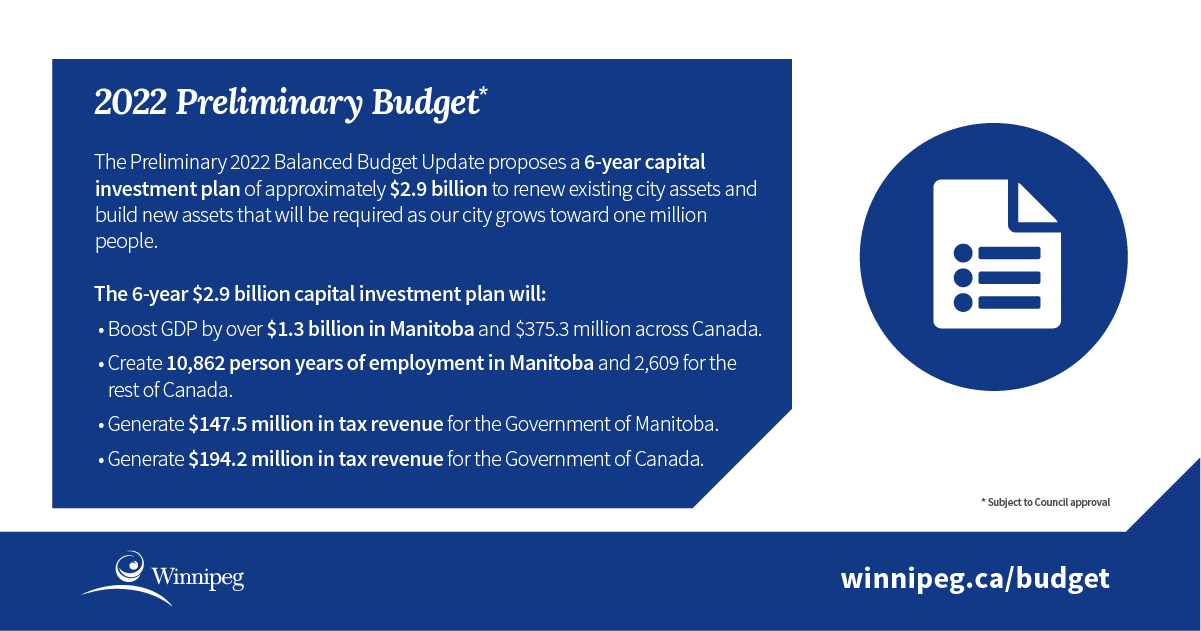
The Preliminary 2022 Balanced Budget Update proposes a 6-year capital investment plan of approximately $2.9 billion to renew existing city assets and build new assets that will be required as our city grows toward one million people.
The 6-year $2.9 billion capital investment plan will:
- Boost GDP by over $1.3 billion in Manitoba and $375.3 million across Canada
- Create 10,862 person years of employment in Manitoba and 2,609 for the rest of Canada
- Generate $147.5 million in tax revenue for the Government of Manitoba
- Generate $194.2 million in tax revenue for the Government of Canada
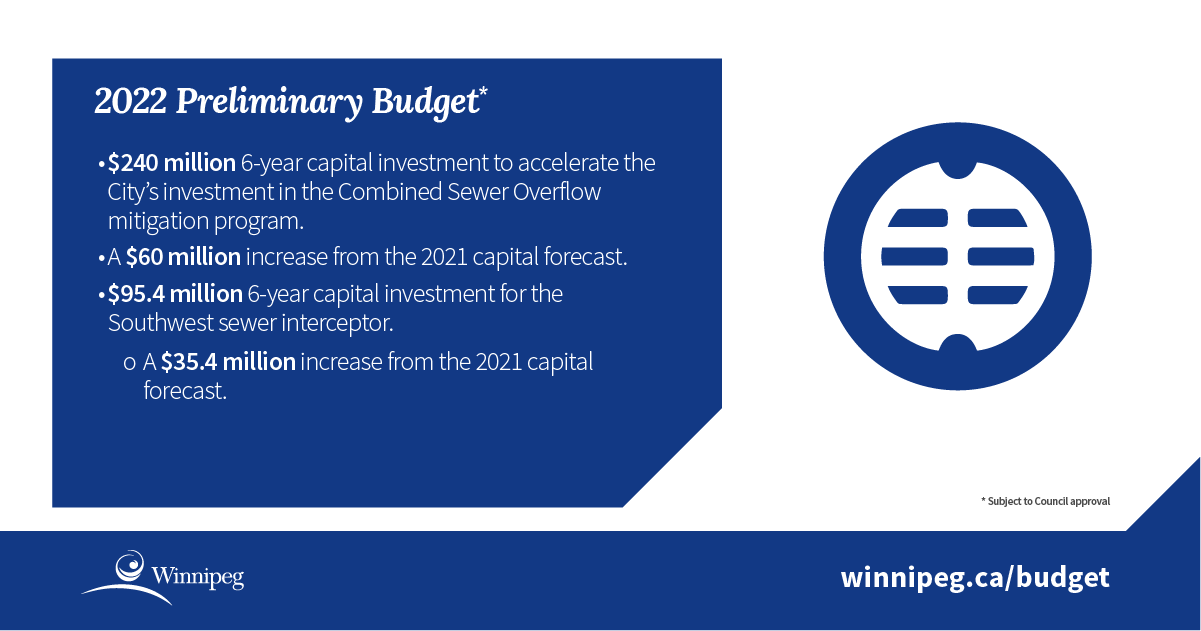
- $240 million 6-year capital investment to accelerate the City’s investment in the Combined Sewer Overflow mitigation program
- $60 million increase from the 2021 capital forecast
- $95.4 million 6-year capital investment for the Southwest sewer interceptor
- A $35.4 million increase from the 2021 capital forecast
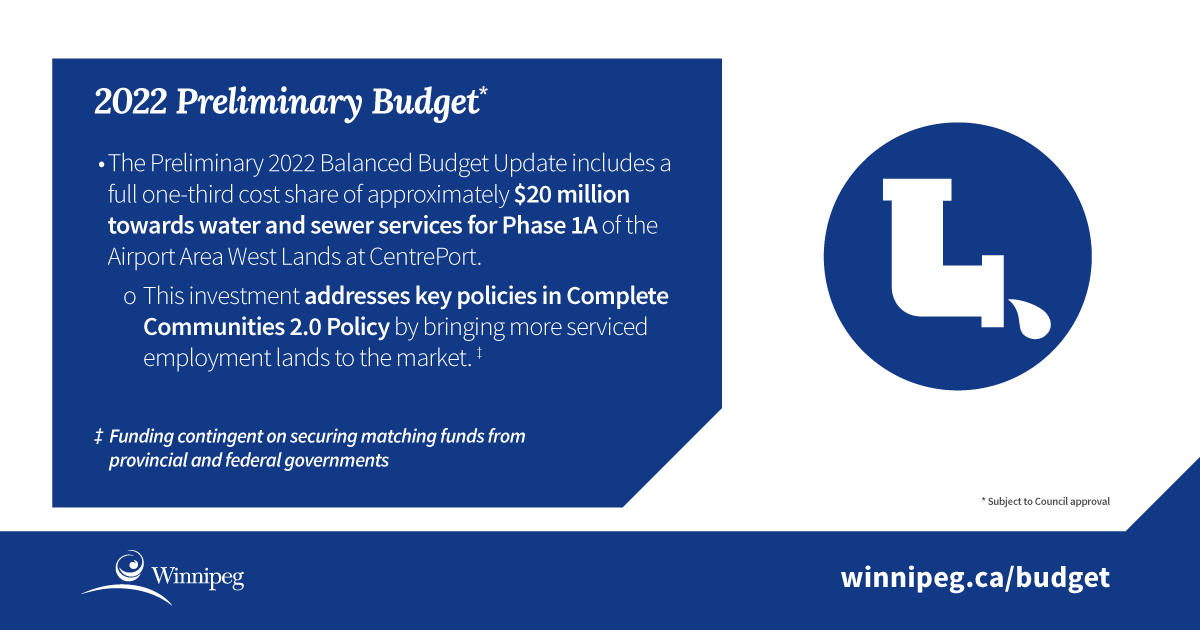
The Preliminary 2022 Balanced Budget Update includes a full one-third cost share of approximately $20 million towards water and sewer services for Phase 1A of the Airport Area West Lands at CentrePort
- This investment addresses key policies in Complete Communities 2.0 Policy by bringing more serviced employment lands to the market
(Funding contingent on securing matching funds from provincial and federal governments)
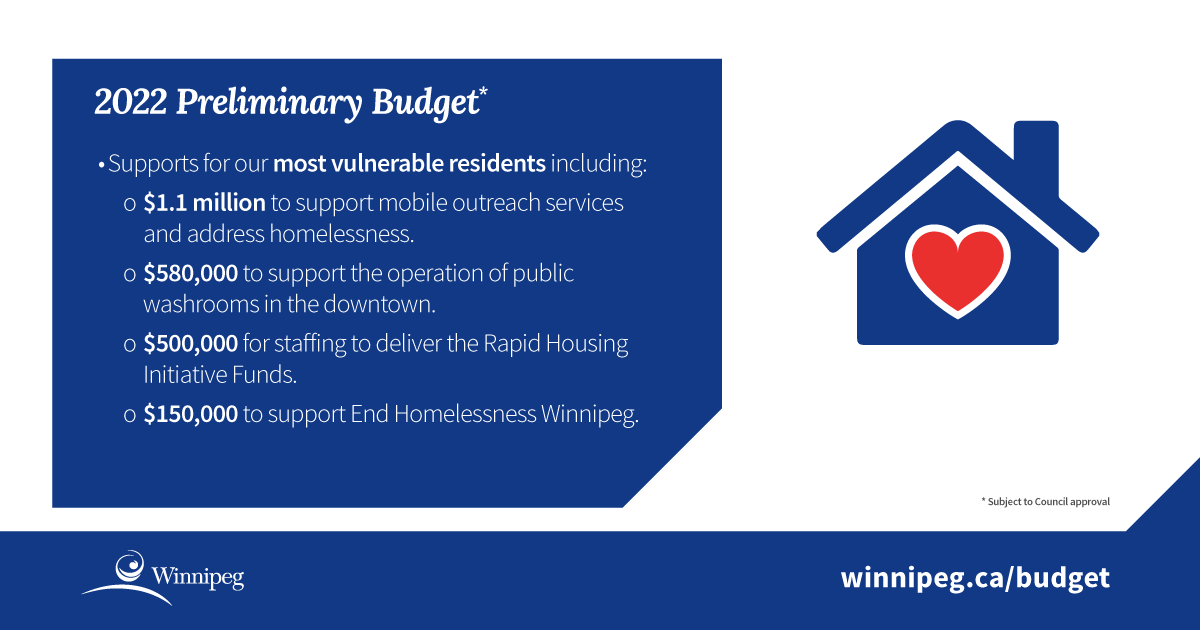
Supports for our most vulnerable residents including:
- $1.1 million to support mobile outreach services and address homelessness
- $580,000 to support the operation of public washrooms in the downtown
- $500,000 for staffing to deliver the Rapid Housing Initiative Funds
- $150,000 to support End Homelessness Winnipeg
Budget news
- February 8, 2022 – City releases year-end Financial Status Report for 2021
- December 15, 2021 – Winnipeg City Council Adopts 2022 Balanced Budget Update
- December 7, 2021 – Preliminary 2022 Balanced Budget Update includes over $2 million in new investments to support the city’s most vulnerable residents
- December 6, 2021 – Preliminary 2022 Balanced Budget Update proposes an accelerated $60 million investment into Combined Sewer Overflows
- December 4, 2021 – Mode shift continues to be prioritized with investments into Winnipeg Transit and active transportation in the Preliminary 2022 Balanced Budget Update
- December 3, 2021 – City releases Financial Status and Forecast Report to October 31, 2021
- November 30, 2021 – Enhancements to the permits system will help support new development and drive economic growth
- November 26, 2021 – Investments into roads continue to reach historic levels in 2022 and over the next six years
- November 26, 2021 – Preliminary 2022 Balanced Budget Update puts focus on capital investments needed for a growing City
- November 26, 2021 – Preliminary 2022 Balanced Budget Update includes $20 million of investments to help Winnipeg begin a multi-year recovery
- November 26, 2021 – Investments in trees continue to be emphasized in Preliminary 2022 Balanced Budget Update
- November 26, 2021 – Winnipeg’s Preliminary 2022 Balanced Budget Update Tabled
- November 8, 2021 – Preliminary 2022 City of Winnipeg Balanced Budget Update to be Tabled on November 26, 2021
- October 8, 2021 – City releases Financial Status and Forecast Report to August 31, 2021 and Economic Outlook for Fall 2021
- September 13, 2021 – City releases Financial Status and Forecast Report to June 30, 2021
- September 9, 2021 – Review Process for the 2022 Balanced Budget Update Initiated


